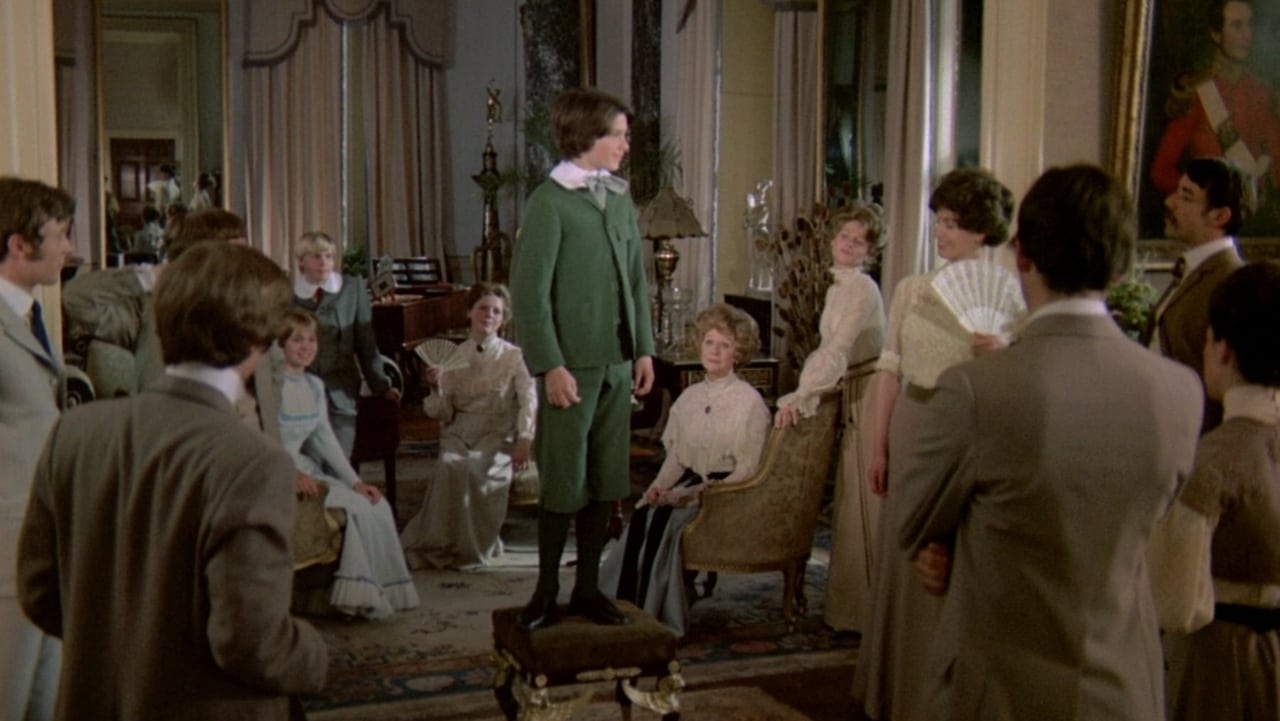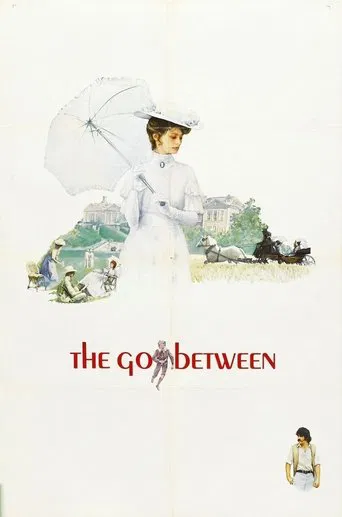

Invited by his upper crust classmate Marcus Maudsley to summer at his family estate thirteen year old Leo Colston is taken into confidence by Marcus's beautiful older sister Marian (Julie Christie) to act as a messenger to her illicit lover, local farmer Ted Burgess (Alan Bates.) Marian is engaged to Lord Trimingham (Edward Fox) whom Leo develops a strong liking for. This complicates matters for Leo who has the same feelings for Ted and out right affection for Marian. The child's innocence becomes a detriment however when he attempts to make sense of the adult world through inquiry of those very much involved and it holds drastic consequence for all.Sumptuously photographed (Gerry Fisher) and magnificently costumed The Go-Between evokes an almost fairy tale milieu in it's early moments with summer in full bloom and the well heeled Maudsleys lounging in finery amid the lush green trappings of their estate. The Empire in 1900 is still sun 24/7 and the Maudleys, confident and mildly aloof, representative of that power. Seen through the adolescent eyes of Marcus we are exposed to the hypocritical trappings of class snobbery, stuffiness and rules of the game. As things begin to unravel the lush lazy days of summer become more storm ridden and the restraint and decorum of the Maudsleys frayed all of which is powerfully summed up and splendidly depicted by Director Joseph Losey in a scene that begins with Leo's birthday party with everyone festooned in paper party hats.Losey's understated style does a nice job of slowly revealing his story for maximum effect. His use of flash forward, confusing at first, is spare but well utilized to tie lose ends together. The overall morose mood of the film is retained throughout though Lalo Schiffrin's score reeking of hysteria threatens it on more than one occasion.Christie and Bates, Edward Fox as Twillingham and the young Dominic Guard are excellent fits in their roles but Margaret Leighton as Lady Maudsley turns on the jets as the film closes and walks away with the acting honors.
... View MoreIn the English countryside of 1900, a boy serves as a messenger between a young woman from a rich family who is engaged to be married to a viscount and a neighbor farmer of lower standing, facilitating a forbidden love affair. Like "Picnic at Hanging Rock," this is a very deliberately paced film where nothing much happens. The main point of interest is the atmosphere, marked by beautiful cinematography. However, with characters who are not terribly interesting and without much of a plot, the film really overstays its welcome at a running time of two hours. The acting is fine all around, including Christie and Bates in the lead roles of the lovers.
... View MoreLosey/Pinter's adaptation of LP Hartley's novel follows Leo, invited to spend the summer with his upper crust schoolfriend's family in Norfolk. He contracts a bit of a crush on Julie Christie's Marian (his friend's older sister) and consequently gets drawn into the awkward, tacit love triangle between her fiancée Trimingham (Fox) and masculine local farmer Ted (Bates). Losey interpolates brief, silent flash-forwards to the present day as Leo revisits the area to speak with Marian in her dotage.If one has seen, or, more pertinently, read Atonement (Joe Wright's film on Ian McEwan's book) then you'll be familiar with the themes and, in part, composition of The Go-Between. Leo divines the sexual tension and intent of the relationship between Marian and Ted but, being not only young but also uninitiated in the implicit obligations of the upper class, cannot understand why Marian is simultaneously agreeing to her union with Trimingham. Unlike Atonement, Leo doesn't wilfully interfere with the relationships. Instead he does act as a catalyst that allows them to happen and is consequently affected by the outcome - the final sequence is a dryly tragic denouement which recalls the TV interview epilogue of Atonement; only here there is no atonement to be made or had.The film is beautifully and unequivocally shot. The past may indeed be a different country, as the voice-over tells us but it's not a figment of the imagination. The acting is very good, with the exception of the younger Maudsleys who are weak. Michel Legrand's score is a cunning set of neo-baroque variations for piano, rendered oppressively rather like the society and heat. Losey's handling of the drizzled flash-forwards is a beautifully rendered conceit that really makes the film for me: wistful, English and eloquent. 7/10
... View MoreRichly-detailed period romantic drama, told more or less from a child's viewpoint but treated with the maturity one has come to expect from a Losey film (the main plot is interspersed with fragmented clips of the boy as an old man - played by Sir Michael Redgrave - revisiting the aristocratic country estate where the majority of the narrative takes place).Though the characters are rather swamped by their surroundings (the two leads are particularly subdued) - as captured by the gleaming cinematography of Gerry Fisher and the elegant décor of Carmen Dillon - the film allows for several good performances from a sturdy cast, including Dominic Guard (as the boy Leo who acts as messenger in the impossible love between upper-class Julie Christie and commoner Alan Bates, both of whom he idolizes), Edward Fox (as Christie's intended, a war-hero), as well as Margaret Leighton and Michael Gough (as her parents); Leighton's role remains in the background for most of the time but, then, she asserts herself during the last third to bring down the couple's relationship - with the unwilling assistance of the bewildered Guard. Besides, Michel Legrand contributes an atypically ominous yet haunting score.This was the third and last time Losey and screenwriter Harold Pinter worked together, constituting a very fruitful and quite extraordinary collaboration; for about two-thirds of its length, the film finds Losey somewhere near his best - the contemporary subplot where Leo reprises his 'services' for an older Christie works less well, in my opinion (and is too sketchily presented anyway), rendering an already deliberately-paced film somewhat overlong! THE GO-BETWEEN won the Golden Palm at the Cannes Film Festival, was nominated for an impressive 12 BAFTA awards (winning 4) but received only 1 Oscar nomination (for Leighton as Best Supporting Actress).
... View More